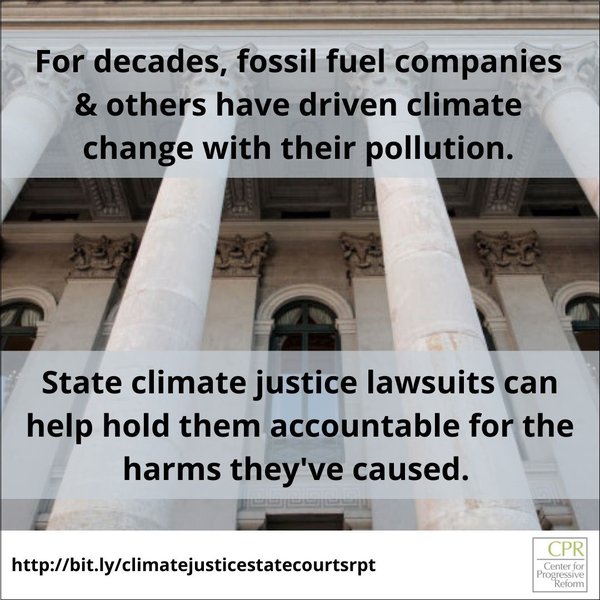As Californians endure yet another round of devastating wildfires, they are rightly wondering if blazes of such frequency and reach are the new normal. The hard truth is that they may very well be. The fingerprints of climate change are all over this disaster, as they have been all over recent hurricane damage, and the trendline is unmistakable. With that in mind, a new report from the Center for Progressive Reform takes a look at the situation in the Golden State and elsewhere and highlights the crucial role state courts play in securing justice for those harmed by climate change.
Just as climate change heats the ocean’s waters, thus increasing the intensity of storms, it also helps drive the drought, wind, and vegetation conditions that provide the fuel and fan the flames of larger and more intense wildfires. Tracing the climate crisis back to its corporate industrial roots, a half dozen California cities and counties and a regional commercial fishing association are pursuing tort lawsuits in state courts to hold dozens of fossil fuel producers accountable for their contributions to global climate change. They're seeking compensation for the regional climate impacts already felt by California residents and businesses, which threaten the state’s coastal and inland communities and its agricultural, fishing, and other economies.
Sadly but not surprisingly, the most socially and economically vulnerable Californians are suffering the most harm from state and federal inaction on the climate crisis, coupled with the corporate malfeasance and negligence that have led us to this point. Such vulnerable populations include rural, low-income homeowners and renters who cannot rehab or abandon their fire-damaged homes and low-wage and migrant workers who are unprotected from climate disaster in their workplaces.
In our new report, CPR Member Scholars and staff explore the great potential that state tort litigation offers for securing a measure of compensation and a modicum of justice for the most climate-vulnerable communities and populations in California and beyond. We find that the growing number of state tort lawsuits against fossil fuel producers and other corporate polluters that fail to adapt to climate change constitute a formidable weapon for the promotion of climate justice and social equity.
READ OUR REPORT: Climate Justice: State Courts and the Fight for Equity
Our report takes a close look at the links between state tort law and its role in promotion of corrective justice and social equity and the particular dynamics of climate change that exacerbate risks of harm to already vulnerable communities and populations. Taking a page from other major movements in tort law, such as litigation against Big Tobacco, we identify the ways in which state climate tort litigation can produce corollary benefits for other action to hold fossil fuel producers and other corporations accountable for climate harms.
Included in our analysis are four state climate tort case studies, illustrating several ways that such litigation has the potential to redress climate harms imposed on vulnerable communities. Those case studies are:
- The city of Baltimore, Maryland, an urban heat island whose residents have suffered worsening heat waves and urban flooding associated with climate change, has brought suit against 26 fossil fuel companies in state court. The harms, according to the suit, are "disproportionately borne by communities made vulnerable by their geographic locations, and by racial and income disparities."
- Imperial Beach, California, the poorest jurisdiction in San Diego County, has brought suit against dozens of fossil fuel producers seeking to recover damages for sea level rise that is forcing the city to consider building sea walls in the face of projections that a third of the city could be destroyed by erosion and flooding by 2100.
- Residents and first responders in Crosby, Texas, outside Houston, have brought suit against Arkema, a chemical company that failed to take adequate precautions against hurricane-related flooding at its local plant, resulting in chemical fires after Hurricane Harvey that caused widespread health problems.
- In California and Oregon, a fisherman's association, acting on behalf of cottage-industry fishermen, has brought suit against ExxonMobil, Shell, BP, Chevron, and other fossil fuel companies seeking damages for climate-driven contamination of one of the West Coast's most lucrative and sustainable fisheries, driving 1,000-plus Dungeness crab boats to abandon the fishery.
The report closes with recommendations to federal and state lawmakers, state courts, the insurance industry and its regulators, and to practitioners of state tort law:
- Congress, state legislatures, and state courts should not restrict or limit climate torts.
- The insurance industry should not be allowed to escape liability for compensation to vulnerable populations harmed by the conduct of their policyholders, and it should impose reasonable conditions on insurance policies that can help reduce risks of harm.
- The plaintiffs' bar should endeavor to provide legal representation to victims of climate change, especially those in disadvantaged communities and populations.
Share this report
You can retweet this report. You can also visit our Facebook page and share it there.

